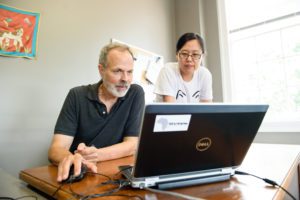A Clemson University computer engineer who is developing new tools to advance freedom of expression on the internet and help protect people in Africa from terrorists and repressive governments was selected as a Distinguished Member of the Association for Computing Machinery (ACM).
Richard Brooks, a professor in the Holcombe Department of Electrical and Computer Engineering at Clemson, was recognized by his ACM peers for outstanding scientific contributions to computing.

“I am honored to be listed alongside such a distinguished group of talented, hard-working individuals,” Brooks said. “I thank my nominators, ACM and all those who have supported me throughout my career.”
ACM’s Distinguished Member program is aimed at recognizing honorees’ professional achievements and long-standing membership with the association, while underscoring how professional society membership enhances career growth.
Brooks joined Clemson as an associate professor in 2004 and has been a full professor since 2014.
Hai Xiao, chair of the Holcombe Department of Electrical and Computer Engineering, said Brooks richly deserves to be a Distinguished Member of ACM.
“The award is a testament to the high level of scholarship and rich international experience that Dr. Brooks brings to Clemson,” Xiao said. “His work is aimed at helping some of the globe’s most disempowered people, a powerful motivator for his students and an example for us all. I offer him my deepest congratulations.”
In one of his more recent projects, Brooks worked with students and Danaides, a French non-governmental organization, to develop and field a smart-phone app to help women in Chad document domestic violence, sexual assault, child marriages and attacks by Boko Haram insurgents. He also serves as chief technical officer of Danaides on a pro bono basis.
Brooks had strong international credentials when he arrived at Clemson. Among the places he worked before launching his career in higher education were the World Bank, where he was a consultant, and Radio Free Europe, where he was manager of systems and applications programming.
Brooks’ received his Ph.D. from Louisiana State University, where his dissertation led to the seminal book, “Multi-Sensor Fusion: Fundamentals and Applications with Software,” which he co-authored with S.S. Iyengar.
The Brooks-Iyengar sensor fusion algorithm was used by the Real-Time Minix system, an essential precursor to RT-Linux. Several large companies have used the algorithm. It was also used in a field demonstration that was the first proof of the usefulness of sensor networks, sensor fusion and the Internet of Things.
Later, Brooks merged concepts from the algorithm with control and game theory for Department of Defense applications in distributed tracking and coordination. The work led to the approach NATO uses to learn shipping lanes and monitor maritime traffic in the North Atlantic.
Brooks has also worked to create communication tools for African dissidents and political activists who face the threat of repressive governments and terrorist networks. The work led to the founding of Africtivistes. The organization advocates for freedom of expression and democratic governance in the region and helps journalists avoid imprisonment.
Brooks continues to work with Africtivistes and has helped train journalists in Mali to avoid capture by Al-Qaeda in the Islamic Maghreb.
Brooks was among 63 Distinguished Members named by ACM this year. ACM “is the world’s largest educational and scientific computing society, uniting educators, researchers and professionals to inspire dialogue, share resources and address the field’s challenges,” according to its website.
Get in touch and we will connect you with the author or another expert.
Or email us at news@clemson.edu

